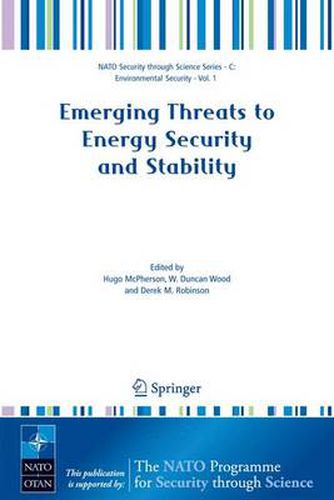Readings Newsletter
Become a Readings Member to make your shopping experience even easier.
Sign in or sign up for free!
You’re not far away from qualifying for FREE standard shipping within Australia
You’ve qualified for FREE standard shipping within Australia
The cart is loading…






This title is printed to order. This book may have been self-published. If so, we cannot guarantee the quality of the content. In the main most books will have gone through the editing process however some may not. We therefore suggest that you be aware of this before ordering this book. If in doubt check either the author or publisher’s details as we are unable to accept any returns unless they are faulty. Please contact us if you have any questions.
Emerging Threats to Energy Security and Stability January 23 to January 25, 2004, Windsor Castle, UK This two-day NATO-sponsored workshop was organised by the Windsor Energy Group and MEC International Ltd with support from NATO’s Science Committee. The workshop was designed to promote a public-private sector exchange on how best to address issues arising in energy security at a time of growing uncertainty. In particular, it sought to assess emerging threats to energy security and stability and discuss new security strategies to protect global energy supplies from regional instability and terrorism. The format involved a wide-ranging international group of poli- formers and advisers from NATO, Partner and other countries, in a unique forum for intensive expert discussion. Background The international community is increasingly conscious of the need to develop new energy security strategies in order to protect global energy supplies from regional instability and terrorism. Energy security is a vital element in international stability. However, a variety of energy-related economic, technical, and military/political factors pose serious challenges to the international community’s pursuit of energy security and stability: The global economy is expected to continue to be largely dependent on oil and gas for the next twenty to thirty years. Current levels of production may need to be doubled in this period, with most of the increment coming from the Gulf States who control 66% of global oil reserves and 40% of global natural gas reserves. There are forecasts of significant capacity shortfalls.
$9.00 standard shipping within Australia
FREE standard shipping within Australia for orders over $100.00
Express & International shipping calculated at checkout
This title is printed to order. This book may have been self-published. If so, we cannot guarantee the quality of the content. In the main most books will have gone through the editing process however some may not. We therefore suggest that you be aware of this before ordering this book. If in doubt check either the author or publisher’s details as we are unable to accept any returns unless they are faulty. Please contact us if you have any questions.
Emerging Threats to Energy Security and Stability January 23 to January 25, 2004, Windsor Castle, UK This two-day NATO-sponsored workshop was organised by the Windsor Energy Group and MEC International Ltd with support from NATO’s Science Committee. The workshop was designed to promote a public-private sector exchange on how best to address issues arising in energy security at a time of growing uncertainty. In particular, it sought to assess emerging threats to energy security and stability and discuss new security strategies to protect global energy supplies from regional instability and terrorism. The format involved a wide-ranging international group of poli- formers and advisers from NATO, Partner and other countries, in a unique forum for intensive expert discussion. Background The international community is increasingly conscious of the need to develop new energy security strategies in order to protect global energy supplies from regional instability and terrorism. Energy security is a vital element in international stability. However, a variety of energy-related economic, technical, and military/political factors pose serious challenges to the international community’s pursuit of energy security and stability: The global economy is expected to continue to be largely dependent on oil and gas for the next twenty to thirty years. Current levels of production may need to be doubled in this period, with most of the increment coming from the Gulf States who control 66% of global oil reserves and 40% of global natural gas reserves. There are forecasts of significant capacity shortfalls.